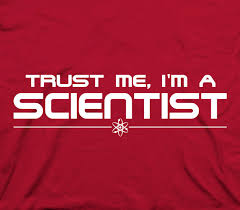A highly publicized report this month was titled “Science Under Siege at the Department of the Interior.” Wow. The implication is that every morning the Secretary, his staff, and his boss the President, wake up wondering what they can do to rid the world of science and scientists.
The report comes from a group called “the Union of Concerned Scientists” (UCS), which sounds credible. After all, if scientists themselves feel threatened, something must be seriously wrong. Except for two details. First, the report is not about science, but about policy and politics. Second, the people issuing it are not scientists engaged in scientific research whose work is being diminished by anybody.
 The authors object to the Administration appointing officials with business and corporate backgrounds, rather than environmental lobbyists. They object to some staffers being reassigned, which every past Secretary has done. One such disgruntled employee retired rather than move, and is now an executive at – you guessed it – the UCS. The report claims Interior is not “upholding the nation’s commitments to Native American communities,” citing the President’s shrinking of two gigantic National Monuments in Utah, both of which were created by previous Presidents over the objections of the people of Utah. The litany also complains of a “rollback” of “safeguards for endangered species like gray wolves and grizzly bears.” In fact, Obama began the years-long process for removing those species from the endangered list.
The authors object to the Administration appointing officials with business and corporate backgrounds, rather than environmental lobbyists. They object to some staffers being reassigned, which every past Secretary has done. One such disgruntled employee retired rather than move, and is now an executive at – you guessed it – the UCS. The report claims Interior is not “upholding the nation’s commitments to Native American communities,” citing the President’s shrinking of two gigantic National Monuments in Utah, both of which were created by previous Presidents over the objections of the people of Utah. The litany also complains of a “rollback” of “safeguards for endangered species like gray wolves and grizzly bears.” In fact, Obama began the years-long process for removing those species from the endangered list.
Interior’s leaders are “systematically refusing to acknowledge or act on climate change.” That allegation is like a broken record these days, but it is the most poorly explained accusation in this report. Interior manages public lands, not the climate. The report never specifies exactly what the authors want that they aren’t getting. Instead, it has a whiney tone that reads like, “Boohoo, nobody is paying attention to me anymore.” Whose fault is that? Every American has a right to say almost anything they want. But to be clear, the Constitution does not guarantee the right to be heard. Whether anyone wants to listen to your opinions depends on your credibility. Reports like this further diminish that credibility, not enhance it.
Predictably, UCS’s main beef with the Administration is the commitment to produce America’s own domestic energy, much of which is on public lands. The authors call that “handing public resources over to the mining and drilling industry.” But the promise of energy independence was among the main reasons this President was elected. Some still object to that goal, but the American people overwhelmingly support it. Either way, that debate is about wise policy, not about science.
Don’t get me wrong. I have nothing against these activists. I defend their right to publish such reports, and to weigh in on any issues they choose. But they really shouldn’t call their advocacy “science,” or presume their views are more valid than others because they are scientists – especially if they are not.
I went to the UCS website to see if I could join, specifically because I am not a scientist. Turns out, it is shockingly easy for someone like me to become a member. My college degree says “social sciences” on it, and that qualifies under the UCS definition, which expressly welcomes history majors like me. They have a “Center for Science and Democracy,” a fund-raising arm. That hyperlink takes you to a website offering “tool kits,” asking you to join and send money. You can “sign up to be a science champion,” get training to write letters to editors, learn “how to lobby,” “organize events,” and confront candidates to “get them on the record.” That is political science.
The “Science Network,” another UCS subgroup, is supposedly composed of 25,000 actual “scientists” – though very loosely defined. They want people with advanced degrees, not just in environmental sciences, but in fields from medicine and engineering to sociology, geography, and languages. Teachers working toward a degree can join, and they welcome “historians or policy experts.” So, a PhD in psychology or ancient Roman history outranks a B.A. in environmental sciences. There is a long list of categories, only two of which are specific to the environment.
Scientists are humans, with opinions like all the rest of us. Just because someone is a scientist does not make their opinion science. This new report is nothing of the kind. In fact, “the Union of Concerned Scientists” is not a “union” by any traditional understanding of that term, and vast numbers of its members are not scientists. Maybe they should just call it “the Concerned.”
This column first appeared in the Grand Junction Daily Sentinel December 21, 2018.




Comments on this entry are closed.